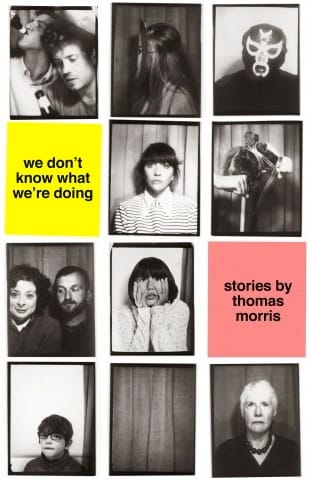What’s the best way to tell area residents about plans for a new asylum shelter nearby?
The government should tell communities directly about plans for new asylum shelters, some activists and politicians say.
The characters in Thomas Morris’s debut collection of short stories may not know what they’re doing, but luckily for us, their author does.

The characters in Thomas Morris’s debut collection of short stories may not know what they’re doing, but luckily for us, their author does.
The stories are all set in or about Morris’s native Caerphilly, South Wales. The themes revolve around the ordinary lives in a small community – relationships, family, work, health, friendship.
Some popular names recur throughout the tales, prompting the reader to wonder if the same characters populate the stories and back stories of the individuals illuminated here, but there is very little authorial trickery going on.
It is the straight, deadpan delivery which sets the tone, allowing the characters to speak for themselves. Despite being written from different viewpoints or in different tenses, it is the uniformly unsentimental delivery which makes this book work as a stylistically cohesive whole.
Most of the characters seem disappointed in themselves. “He dreams of losing teeth and being chased, and in the mornings he’d disappointed by the obviousness of these dreams.”
When tragedy lurks in the background, often punctuating a working day, melodrama is avoided by the deliberate plainness of the prose. “You can’t really ask a woman whose son has died of a heroin overdose to redo the bit about finding his body because of ‘noise interference’.” The characters live one step removed from their feelings, or at least what they think they’re supposed to be feeling. “This isn’t depression, you think. This is eating.”

The simplicity of the language, and the ease with which you’ll glide through the ten stories, make the surreal touches more unexpected when they do crop up. Read the horrific but matter-of-fact image at the end of Fugue, and wonder if it actually happened – then reread it, and realise the signposts are there.
On a rare trip outside Wales, a stag party go on holiday to Dublin. There’s a lovely moment when the boys visit Croke Park, and their tour guide explains Bloody Sunday. “And Gareth will be sort of startled. Something the guide says, something of its tone, will resonate. Though resonate isn’t quite how Gareth would put it; he won’t even know what he’s thinking. He’ll just be looking out to the far stand, trying to picture how it all happened.”
There are also recurring themes of characters looking younger than they are, watching too much TV, and feeling guilty about shirking their adult responsibilities. They also need the bathroom a lot. Awkward. A key moment happens in all the boys (you read that right, all lower case).
“It’s not real, though,” Larry will say. “I reckon we’re in The Matrix. We’re gonna wake up and we’re gonna be five years old and it’s gonna be the end of the first day at school again and – ” Kidulthood is alive and not too well, fretting on a sofa in a backwater of modern Britain.
There’s even a suggestion that Morris is all too aware of the small-scale pockets of emptiness which the characters inhabit. “Emma’s stories often went nowhere. There’d be no punchline or moral or anything like that, but as she spoke, twirling her hair with a single finger, it just seemed like each story was a layer of snow she was pushing off a mountain. She wasn’t looking to see where it fell, she just wanted it gone.” This sums up the mood of many of the tales, where broken lives meander along, and few people make sense of their predicament.
The final story, Nos Da (Welsh for “good night”) hints that there may be darker themes or landscapes which Morris is keen to explore – it could almost be an outtake from Charlie Brooker’s Black Mirror. The entire collection is stark, bleak, and carefully observed, but not without moments of poignancy. Lovely stuff.
We Don’t Know What We’re Doing by Thomas Morris (Faber & Faber, August 2015)